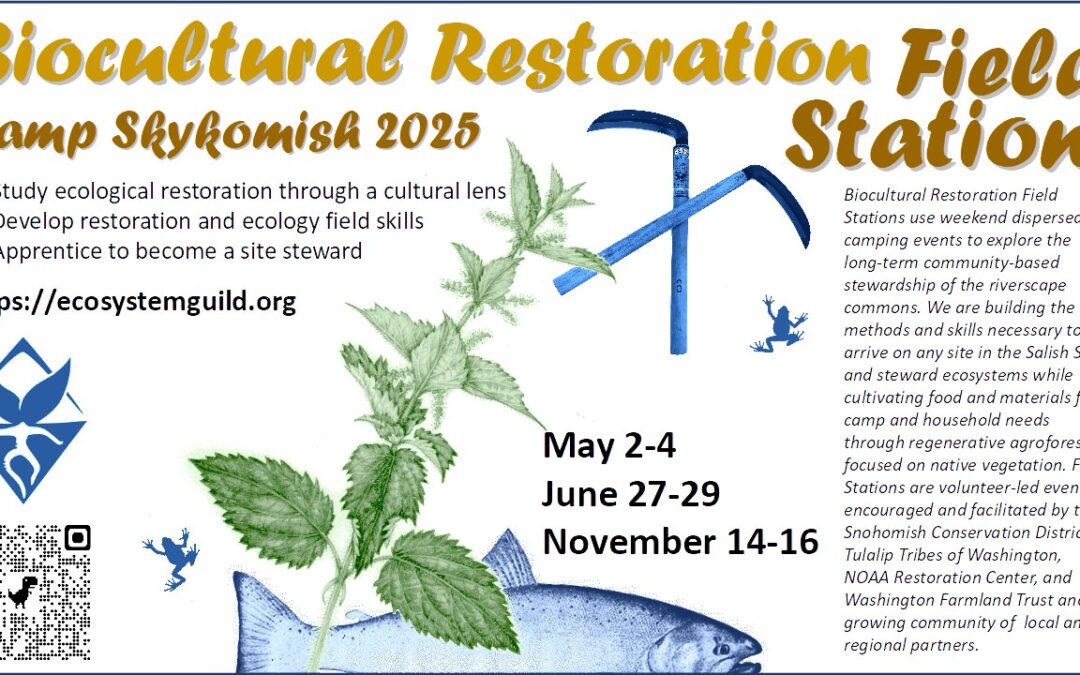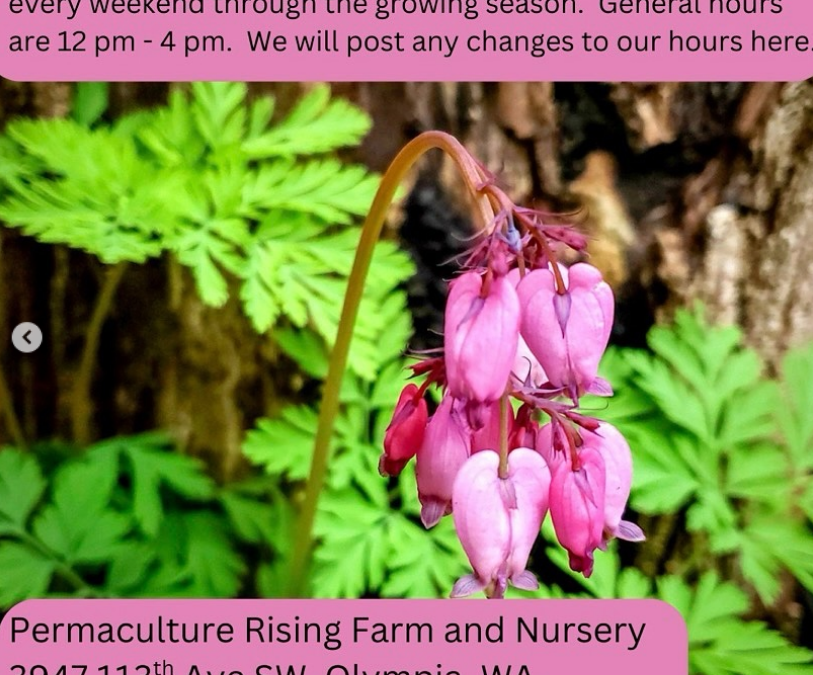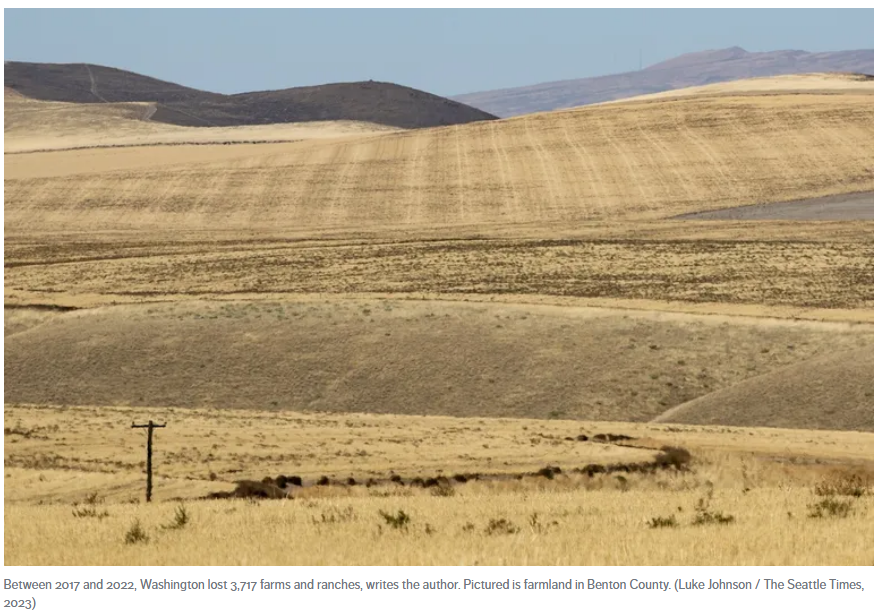Can Our Convergence Support Farms and Farmers?
A friend of mine sent me this….
Between 2017 and 2022, our state lost 3,717 farms and ranches. It also lost more than 102,000 food-producing acres. To put these numbers in perspective, Washington lost a total of 3,456 farms in the previous decade.
A panel of farmers at your 2024 convergence might just be the ticket to bring this crisis to our attention, and to deepen our understanding of the importance of farmers in our communities and bioregions.
These folks know. We don’t. They are also being eliminated in Europe to “reduce carbon” in the name of climate change. Perhaps we can stand in solidarity with them, create an alliance and help educate in regenerative farming. Read original article here.
Fourteen farms a week vanished from Washington state every week during the last five years. The U.S. Department of Agriculture recently released data from the U.S. Census of Agriculture and the numbers are shocking.
Between 2017 and 2022, our state lost 3,717 farms and ranches. It also lost more than 102,000 food-producing acres. To put these numbers in perspective, Washington lost a total of 3,456 farms in the previous decade.
We all know that correlation does not equal causation. Yet increases in operating costs and the enactment of hostile state and federal agricultural policy certainly suggest causation.
For example, 2022 was the first year agricultural overtime pay was implemented in Washington state.
In just a year’s time, agricultural employers saw their labor costs increase nearly 10% per employee by adding just five hours of overtime pay a week. An increase of $107.73 per employee, applied to the 164,000 farmworkers in our state, represents an increase of $17.67 million in overtime wages a week industry wide.
Farms and ranches are often misunderstood in discussions about labor, with the prevailing belief being that increased costs can simply be passed on to the consumer. However, farms and ranches negotiate set prices often before their operating prices are incurred. The overtime law also reinforced the mistaken but persistent belief that farms and ranches are rife with poor treatment of people who work hard, often far from their homes and native languages.
Similarly, in recent years, debates around riparian buffers have spotlighted an urban prejudice against agriculture in environmental stewardship. The dominant urban presumption seems to be those least connected to land care the most, while farmers and ranchers have an exploitative relationship with it.
Like other industries, our state’s farms and ranches have evolved. The perception of them should evolve too. The focus on good working relationships, living wages, environmental stewardship and care for the land, water, soil and native species is an intrinsic part of agricultural life. Without well-paid employees or healthy land and clean water, farms and ranches are stripped of yet another part of their means of survival.
As our farms disappear, so, too, does our access to food grown locally. Gone will be the opportunities for low-income families to shop for local produce at a fruit stand or farmers market stall. Gone will be the chance for individuals to find meat that is grass-fed from a rancher they have met.
Taking away direct access to locally produced food takes away access to true food equity — ensuring that everyone has access to food. When local food producers are forced to focus on their survival, charitable efforts are often among the first items to be sacrificed. Donations of fresh produce to food banks are often abandoned in favor of monetizing as much product as possible.
While the disappearance of 3,717 farms in five years is deeply concerning to the agricultural community in our state, it should alarm every Washingtonian.
William Jennings Bryan wrote, “Burn down your cities and leave our farms, and your cities will spring up again as if by magic; but destroy our farms and the grass will grow in the streets of every city in the country.”
Maybe Bryan was wrong about the grass growing in our streets. Maybe mega-corporate farms and automated technologies can replace the American farmer and maybe consumers won’t mind having fewer choices and a lowered standard of freshness. But is that a future we want to promote?
The fates of the Washington farmer and the thousands of families that rely on them for work are largely in the hands of increasingly urban lawmakers and the people they serve. The only question that remains is whether they will seek a deeper understanding and accommodation of the unique challenges of farming, or will they end it as a way of life?
Pam Lewison is a fourth-generation farmer in Eastern Washington and the director of the center for Agriculture at the Washington Policy Center.

Reclaiming What the Company Took
A Response to The Article on Substack by Ravi Login called the World is Becoming a Company Town This week’s reflection begins with a quiet image, a young boy rowing across Gamble Bay toward the town of Port Gamble. What unfolds is not simply nostalgia, but a...

The World is Becoming a Company Town
An article by Ravi Login on the Crisis and Transition Substack. When I was a young boy my family bought an undeveloped two-acre property on the shore of Gamble Bay, located near the mouth of Hood Canal in Washington State. My grandfather made us a small rowboat, and I...

Skykomish River Restoration Field Station May 2-4th 2025
Paul Cereghino, [4/16/2025 ] invitation to Restoration Field Station May 2-4 2025 Come spend time outside working with plants and soils and exploring ecosystem stewardship? Are you interested in our riverscape commons? Would you like to meet like-minded people through...

Indigenous Leadership & Lifeways April 2025 Newsletter (GCILL)
Upcoming Events - Global Center for Indigenous Leadership & Lifeways (GCILL) A Gathering of Elders & WisdomkeepersMay 4th, 202511:30a - 1:30p PT (find your timezone here)ALL WELCOME! This is the time of purification for Mother Earth. She must purify herself of...

Let’s Keep the Circle Unbroken: Rebuilding the Skylodge
Renew our home for earth community healing. Under a weathered canvas, thousands have gathered—sharing stories, learning, singing, debating, and dreaming of a better world. This simple yet extraordinary structure, the Skylodge, has been much more than a shelter. It...

Visit a Permaculture Plan Nursery in Olympia WA
Marisha Auerbach of Permaculture Rising Invites You to Permaculture Plant Sales. Permaculture is about cultivating relationship between ourselves and our environment. We hope that we can help to lure you into the bountiful world of the garden to dance with life and...

Procession of Species Bellingham
Join our beloved community tradition celebrating nature, art, and connection! Family-friendly activities include: - Free craft days: April 13 & 27 (1-4 PM at Maritime Heritage Park) - Costume procession through downtown (2 PM start) - Post-procession festival...

Bioregional News – Cascadia is your movement!
It’s not too late! Join our Cascadia Cohort in the Design School for Regenerating Earth 2025 Learning Journey: How to Organize Your Bioregion More than 100 people from across the Cascadia bioregion have already joined the Design School for Regenerating Earth’s...

Sahale Nature Systems Weekend April 12 – 13, 2025
Sahale Welcomes YOU to another Nature Systems Weekend April 12 - 13, 2025Our next Nature Systems weekend for 2025 Saturday and Sunday, April 12-13 Does life feel crazy and chaotic these days? Are you ready to get out of town for a weekend, or even a day, of calming...

Outgrow the System Film Screening May 2 2025 Seattle
The economy is failing people and the planet. What comes next? FILM SCREENING AND COMMUNITY DISCUSSIONFRIDAY | MAY 2, 2025 | 6:00PM | FREE ADMISSIONMount Baker Community Club | 2811 Mt Baker Drive S, Seattle Our current system is devouring natural resources at...

